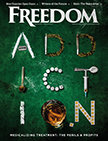
2014
1969

Written late into the night and rushed to the printer, the two-page broadsheet boldly displayed the word that strikes a chord in every person’s heart: freedom.
Alerting Members of Parliament and others in the United Kingdom to a threat to religious freedom in that land, the impact of that first publication in 1968 reverberated far beyond the shores of Britain. Soon, larger editions were being printed not only in England but in the United States and other nations—as far away as Australia—and newsprint broadsheets transformed to glossy magazines.
Today, Freedom carries forward a 46-year tradition of award-winning reporting on human rights, relentless investigative journalism in the public interest, and service as the voice of the Church of Scientology.
While Freedom has changed and evolved, the one constant has been the theme to which it always returns, the concept emblazoned on its masthead. In the mid-1970s, Freedom exposed slave camps in South Africa where thousands of black “mental patients”—often grabbed off the streets on the flimsy charge of “wandering at large”—were underfed, poorly clothed, abused, drugged, electroshocked and compelled to labor under appalling conditions for profit-driven masters.
Although the apartheid government reacted with fury, banning Freedom, the World Health Organization confirmed Freedom’s findings, comparing the operation to “the ownership and trading of slaves.” Work to correct abuses continued, and South Africa eventually adopted a charter to protect patients’ rights. The nation’s Minister of Arts, Culture, Science and Technology later acknowledged the Church “for exposing the most horrendous practices of the apartheid system.”
In the 1990s, Freedom was among the first publications to document the actual source afflicting sick and dying Gulf War veterans—whose physical problems were not “in their heads,” as psychiatrists had been telling them—and to demand they receive the care they needed.
Through the years, many examples show Freedom’s groundbreaking coverage—the real cause of school shootings, human rights violations in foster care systems, exploitation and genocide of indigenous peoples, and more.
This brings us to the current issue. It contains a commentary by award-winning author Dan Luzadder, who looks into the world of book reviewers and publishers, and the conflicts of interest that too often corrupt the process.
Readers will meet the parents of several young Americans who volunteered for the armed forces and died—not in combat, but from an enemy they never saw coming: sudden cardiac arrest triggered by prescribed psychiatric drugs.
We include an investigative report on modern slavery in the United States, as well as articles on efforts to reverse the plight of women in Nepal and Nigeria, where human rights abuses abound.
To bring news about the world of Scientology, we cover the opening of the new Ideal Church of Scientology in Sydney, Australia, detailing the celebration.
There’s also a photo feature on the work of the Volunteer Ministers Disaster Response Team, providing organizational and spiritual assistance in hundreds of disaster zones worldwide.
This issue has a different look, a new design whose purpose is to assist readers through a compelling display of articles and features. Behind that design are other changes. Freedom’s staff, based in Los Angeles, Washington, D.C., and Clearwater, Florida, with correspondents globally, is being greatly expanded.
Their mission—as it has been since 1968—is to uncover human rights abuses and societal problems, and to offer sound, innovative solutions. Equally important, Freedom will report the news about Scientology, and how it labors to create a better world.
— The Editors





























